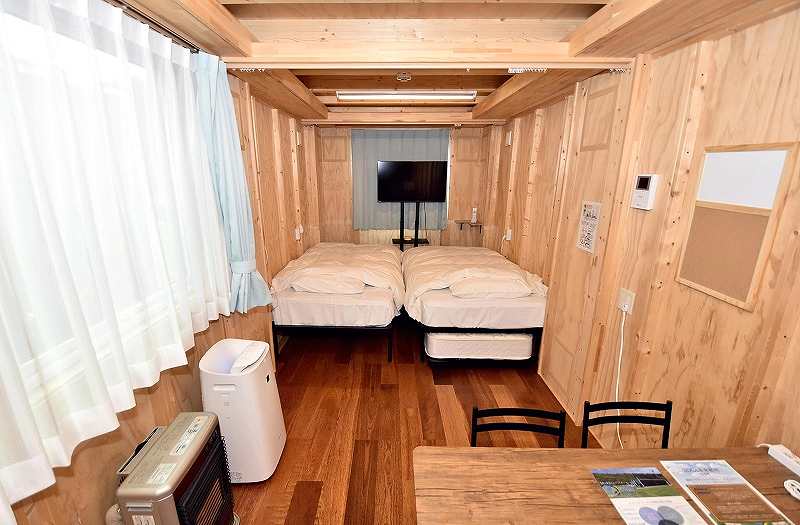
A guest room of a hotel incorporating temporary housing units for disaster victims.
2:00 JST, November 11, 2022
A new hotel in Iwate Prefecture consists of rooms that used to be in Hokkaido.
A new hotel in Iwate Prefecture consists of rooms that used to be in Hokkaido.
The municipal government of the town of Iwate set up the hotel by purchasing three portable wooden housing units that had previously been occupied by survivors of a 2018 earthquake in the Iburi region of southern Hokkaido.
The town government installed the units in a general sports park. Run by a private company, the hotel is also intended for use as a quarantine facility or evacuation shelter in times of emergency. “We would like to use the hotel to revitalize the town while preparing for [a renewed] coronavirus outbreak and other disasters,” a town government official said.
The facility consists of container-type housing units called “mobile houses,” which can be transported by using a crane to lift them onto a trailer, among other means. These facilities were used as temporary housing for about two years in Mukawacho, Hokkaido, for victims of the September 2018 earthquake, which had an intensity of upper 6 on the Japanese seismic scale of 7.
In the wake of the much larger Great East Japan Earthquake in March 2011, temporary housing facilities for disaster victims fell into two typical types: Some facilities were actually built on the ground like prefabricated housing units, while others, called “deemed temporary housing,” were spaces like existing apartment units rented by municipalities. But the former type requires time and expense to secure land and construction materials, while the latter type tends to be located in different places, often causing victims to become isolated.
Compared to these, portable temporary housing facilities are prepared simply by installing already-finished housing units, and they can be transferred to the locations where they are most needed. Since they are more durable than prefabricated housing, they do not require dismantling after their temporary use and can be reused.
In response to the novel coronavirus pandemic, the Iwate town government planned to use portable wooden housing units as quarantine facilities to accommodate COVID-19 patients and their families. The town utilized extraordinary subsidies granted by the central government for fighting the pandemic to buy three portable wooden housing units for about ¥38 million from a construction company in Hokkaido, which provided temporary housing units.
The town government signed a designated operator contract with Clever Racoon Corp., an Ibaraki Prefecture-based company engaged in disaster-prevention business and other areas, and created a system in which these facilities are to be used as accommodation facilities in ordinary times and as evacuation shelters or temporary housing in case of disaster.
According to the town government, it is the first time in Japan for a municipality to buy temporary housing units that were used for disaster victims to reuse them as an accommodation facility.
Up to ¥8,500 per night
The Mobilita Court Iwate hotel opened on Oct. 12, with six guest rooms of two types — a 27-square-meter room accommodating up to three guests and a 43-square-meter room accommodating up to five. All rooms are equipped with a kitchen and a laundry machine. Outer walls are covered in an insulating material to increase heat retention and sound insulation. Guests enter a code to unlock the door and can check in at the hotel in a contactless manner.
A hotel stay costs up to ¥8,500 per person per night including tax, with rates varying depending on season or the number of guests. Shojiro Fujinuma, 47, the president of the operating company, said, “We would like to prepare accommodation plans to allow guests to fully enjoy the town, such as cooperating with local restaurants and taxi companies to get food delivered to the hotel.”
The sports park is near Iwate Numakunai Station, served by the Tohoku Shinkansen and other trains. It has various sporting facilities such as a field hockey pitch. “The hotel can be readily operated as an evacuation shelter or as temporary housing in case of disaster,” a town government official said. “We would like the facility to be used for training camps and other purposes in ordinary times to help increase the number of people visiting the town.”
Top Articles in Society
-

Producer Behind Pop Group XG Arrested for Cocaine Possession
-

Man Infected with Measles Reportedly Dined at Restaurant in Tokyo Station
-

Man Infected with Measles May Have Come in Contact with Many People in Tokyo, Went to Store, Restaurant Around When Symptoms Emerged
-

Woman with Measles Visited Hospital in Tokyo Multiple Times Before Being Diagnosed with Disease
-

Australian Woman Dies After Mishap on Ski Lift in Nagano Prefecture
JN ACCESS RANKING
-

Producer Behind Pop Group XG Arrested for Cocaine Possession
-

Japan PM Takaichi’s Cabinet Resigns en Masse
-

Man Infected with Measles Reportedly Dined at Restaurant in Tokyo Station
-

Israeli Ambassador to Japan Speaks about Japan’s Role in the Reconstruction of Gaza
-

Videos Plagiarized, Reposted with False Subtitles Claiming ‘Ryukyu Belongs to China’; Anti-China False Information Also Posted in Japan



















